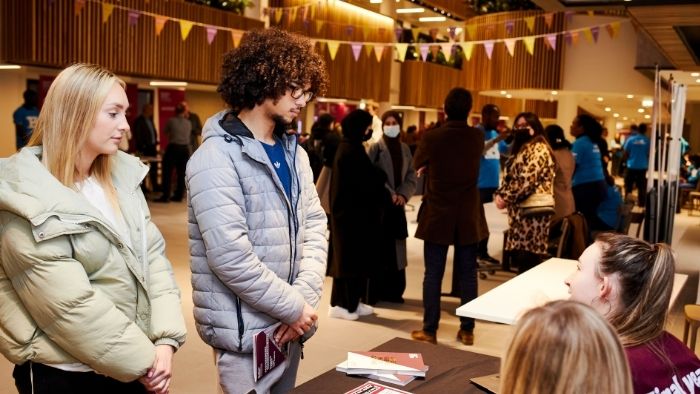Everything you need to know...
-
What is the fee?
Home: £10,310 for the course
International/EU: £17,205 for the course -
How long will I study?
1 Year
-
Where will I study?
-
When do I start?
September 2024
Course summary
- Examine the processes underlying the development of malignancy.
- Develop applied research techniques using state-of-the-art lab facilities.
- Design, execute and interpret practical work within the field of neoplastic transformation, diagnosis and treatment.
- Build confidence in presenting your work to academic and professional audiences.
This course provides a stimulating, challenging and enjoyable experience of studying cancer biology with practical applications in the forefront of the cancer field. Led by research active cancer biologists, you will develop an understanding of the pathogenesis of malignant transformation from a cellular to whole system level, discussing methods for the diagnosis and treatment of patients.

Come to an open day
Find out more at our postgraduate open days. Book now for your place.
How you learn
Your lecturer's view
All our courses are designed around a set of key principles based on engaging you with the world, collaborating with others, challenging you to think in new ways, and providing you with a supportive environment in which you can thrive.
Cancer biology plays a pivotal and essential role in healthcare. This course is designed in response to the demand across industries for highly skilled researchers.
The component subjects are at the forefront of modern science and attract leading-edge research activity. The programme aims to explore normal and pathological cell processes, relating these to clinical features, diagnostic procedures and responses to therapy in neoplastic disease. You can customise your learning by selecting a speciality from translational research, genomics and proteomics and current laboratory applications. Modules may include topics such as the therapeutic targeting of cancer, the hallmarks of cancer and applied laboratory practice.
You learn through
- lectures and seminars
- a programme of laboratory classes
- semester long research project
- scientific writing
- oral presentations
- data handling
Course leaders and tutors

Sarah Haywood-Small
Senior LecturerSarah received a BSc (Hons) in Biological Chemistry from Leicester University and a PhD in Cancer Studies from Sheffield University. After completing postdoctoral re … Read more
Applied learning
Laboratory experience and research project
You will have the opportunity to conduct semester long investigative research project within the cancer biology field. This will be aligned with the current research interests of an academic member of staff within the Biomolecular Sciences Research Centre.
The work will be aligned with the current research interests of an academic member of staff within our specialist Biomolecular Sciences Research Centre. The project will include a critical review of the literature relevant to your research project, the development of a project proposal, design of research methods and the analysis, presentation and interpretation of experimental data.
Practical skills are developed throughout the course and you gain experience in molecular biology and other related techniques such as genomics, proteomics and bioinformatics. All practical classes are led by academic staff whose research incorporates the latest research techniques. Research skills and statistical analysis are developed throughout the programme and applied to relevant cancer-based problems and case studies.
Future careers
This course prepares you for a career in
- research in healthcare, pharmaceuticals or biotechnology
- academic research
- medical sales
- scientific writing
- consultancy
Previous graduates of this course have gone on to work for
- NHS
- Public Health England
- Novartis
- ThermoFisher Scientific
Where will I study?
You study at City Campus through a structured mix of lectures, seminars and practical sessions as well as access to digital and online resources to support your learning.
City Campus
City Campus is located in the heart of Sheffield, within minutes of the train and bus stations.
City Campus map | City Campus tour

Adsetts library
Adsetts Library is located on our City Campus. It's open 24 hours a day, every day.
Learn moreEquipment and facilities
On this course you work with state-of-the-art facilities, including
- industry-standard instrumentation
- a mass spectrometry unit
- cell culture and tissue engineering facilities
- multicoloured flow cytometry
- a microscopy suite
Entry requirements
All students
A 2:1 in a relevant Honours degree is normally accepted as the entry requirement for the course. Applicants with a 2:2 are also actively encouraged to apply and will be considered on an individual basis. Applicants with alternative qualifications with academic attainment or skills in subjects which are directly relevant to the course will also be considered.
If English is not your first language you will need an IELTS score of 6.0 with a minimum of 5.5 in all skills, or a recognised equivalent.
Additional information for EU/International students
If you are an International or non-UK European student, you can find out more about the country specific qualifications we accept on our international qualifications page.
For details of English language entry requirements (IELTS), please see the information for 'All students'.
Modules
Important notice: The structure of this course is periodically reviewed and enhanced to provide the best possible learning experience for our students and ensure ongoing compliance with any professional, statutory and regulatory body standards. Module structure, content, delivery and assessment may change, but we expect the focus of the course and the learning outcomes to remain as described above. Following any changes, updated module information will be published on this page.
Final year
Compulsory modules
Advanced Laboratory And Research Practice
Applied Laboratory Practice
Cellular And Molecular Basis Of Cancer
Hallmarks Of Cancer
Research Project
Therapeutic Targeting In Cancer
Elective modules
Cell And Molecular Biology
Cell Biology
Genomics And Proteomics
Translational Research
Fees and funding
Home students
Our tuition fee for UK students starting full-time study in 2024/25 is £10,310 for the course. The tuition fee displayed above is for the full course. If the full course is more than one year in duration, the fee will be divided into annual payments which will then be rounded. This may mean the total fee you pay is slightly higher than the fee stated above. If you take a break in study or have to re-take part of the course, you may also be charged an additional fee and will be notified of this at the time.
If you are studying an undergraduate course, postgraduate pre-registration course or postgraduate research course over more than one academic year then your tuition fees may increase in subsequent years in line with Government regulations or UK Research and Innovation (UKRI) published fees. More information can be found in our terms and conditions under student fees regulations.
International students
Our tuition fee for International/EU students starting full-time study in 2024/25 is £17,205 for the course. The tuition fee displayed above is for the full course. If the full course is more than one year in duration, the fee will be divided into annual payments which will then be rounded. This may mean the total fee you pay is slightly higher than the fee stated above. If you take a break in study or have to re-take part of the course, you may also be charged an additional fee and will be notified of this at the time.

Postgraduate student loans
Up to £11,222 available for Home students on most masters courses.
Additional course costs
This link allows you to view estimated costs associated with the main activities on specific courses. These are estimates and, as such, are only an indication of additional course costs. Actual costs can vary greatly depending on the choices you make during your course.
Additional costs for Biosciences and chemistry courses (PDF, 331.6KB)Legal information
Any offer of a place to study is subject to your acceptance of the University’s Terms and Conditions and Student Regulations.





